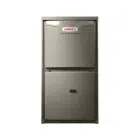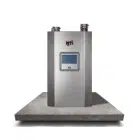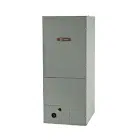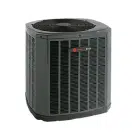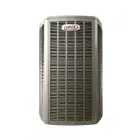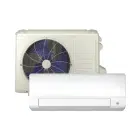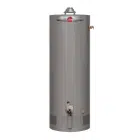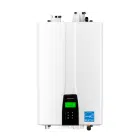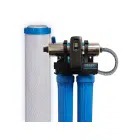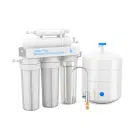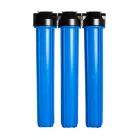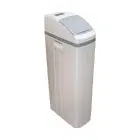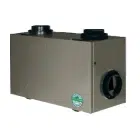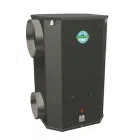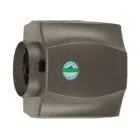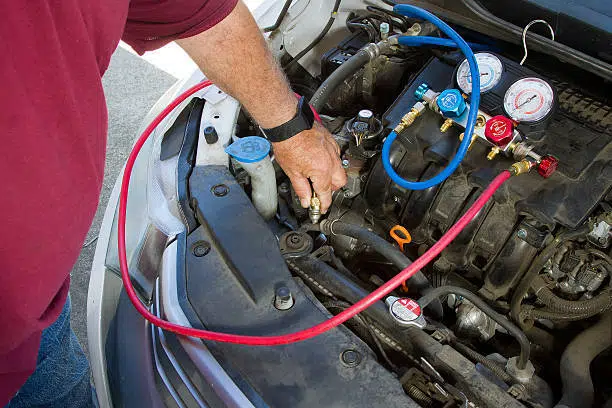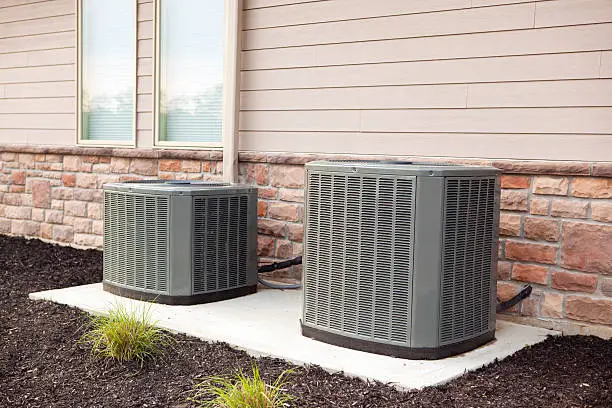
Table of Contents
In the quest for efficient and eco-friendly home heating and cooling, heat pumps have emerged as a frontrunner. As Canadians prioritize sustainability and energy savings, understanding the workings of heat pumps becomes imperative. In this guide, we will figure out how a heat pump works, what types of heat pumps are available, and how you can save up on your new energy-efficient heat pump.
What is a Heat Pump System?
A heat pump is a sophisticated heating and cooling system that operates by transferring heat from one location to another. Unlike traditional furnaces or air conditioners, which generate heat or cold air through combustion or refrigeration, heat pumps utilize the principles of thermodynamics to move heat. The heat pump work process allows them to provide both heating and cooling functions with remarkable efficiency.
In a heat pump system, various components work in tandem to facilitate heat transfer. The compressor pressurizes the refrigerant, while the evaporator absorbs heat from the source (air, ground, or water). The heated refrigerant then travels to the condenser, where it releases heat into the indoor space. Finally, the expansion valve regulates the flow of refrigerant, completing the cycle.
Curious about the heat pump installation cost in Canada? Check out our previous article.
How Does a Heat Pump Work?
To truly grasp how a heat pump works, it’s essential to delve into the intricacies of its operation. At its core, a heat pump operates on the principles of thermodynamics, utilizing the natural flow of heat from areas of high concentration to low concentration.
Heating Mode
During the heating mode, the heat pump extracts thermal energy from the outdoor environment, whether it be from the air, ground, or water source. Even in colder climates, there’s still latent heat present in the atmosphere that can be harnessed. This absorbed heat is then transferred to the refrigerant circulating within the system.
As the refrigerant absorbs heat, it undergoes a phase change from a low-pressure gas to a high-pressure liquid within the evaporator coil. The compressor then pressurizes the heated refrigerant, raising its temperature significantly. The now high-pressure, high-temperature refrigerant flows to the condenser coil, where it releases its heat energy into the indoor space.
Meanwhile, a fan blows air over the warm condenser coil, facilitating the transfer of heat to the indoor air. This heated air is then circulated throughout the living space via ductwork or a ductless system, providing consistent warmth and comfort.
Cooling Mode
Conversely, during the cooling mode, the heat pump reverses the flow of refrigerant to remove heat from indoors and release it outside. The process begins with the refrigerant absorbing heat from the indoor air as it passes over the evaporator coil. This absorbed heat causes the refrigerant to evaporate, absorbing energy in the process.
The compressor then pressurizes the low-pressure vaporized refrigerant, raising its temperature further. The now high-pressure, high-temperature refrigerant flows to the condenser coil, where it releases its heat energy into the outdoor environment.
As the fan blows air over the condenser coil, the heat is dissipated into the surrounding air, effectively cooling the refrigerant back into a liquid state. This cooled liquid returns to the indoor unit, ready to absorb more heat and continue the cooling cycle.
By leveraging the ambient temperature of the environment, heat pumps can maintain comfortable indoor temperatures year-round, regardless of the weather conditions. Whether it’s extracting heat from the cold outdoor air in winter or dissipating heat into the warm outdoor air in summer, heat pumps provide efficient and versatile climate control for residential and commercial spaces alike.
Types of Heat Pumps
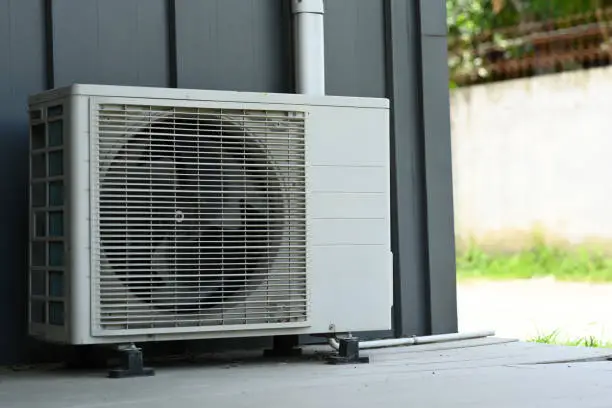
Heat pumps in Canada are available in various types, each designed to cater to specific environmental conditions and installation requirements. Understanding the differences between these types of heat pump can help homeowners and businesses make informed decisions when selecting the most suitable option for their needs.
Air Source Heat Pumps
Air source heat pumps are the most common type and operate by extracting heat from the outdoor air. They work efficiently even in cold climates, though their performance may decrease in extremely low temperatures.
Advantages:
- Affordable upfront cost compared to other types.
- Relatively easy installation process, making them ideal for residential applications.
- Versatile and adaptable to various settings.
Limitations:
- Reduced efficiency in extremely cold climates.
- Dependence on outdoor air temperature for heat exchange.
Ground Source Heat Pumps (Geothermal Heat Pumps)
Ground source heat pumps utilize the stable temperature of the earth for heat exchange. They circulate a fluid through underground pipes, absorbing heat from the ground in the winter and dissipating heat into the ground in the summer.
Advantages:
- Higher efficiency and consistency of performance compared to air source heat pumps.
- Minimal impact of outdoor temperature fluctuations on performance.
- Long lifespan and low maintenance requirements.
Limitations:
- Higher upfront costs due to the need for excavation and installation of ground loops.
- Requires sufficient space for ground loop installation.
Water Source Heat Pumps
Water source heat pumps extract heat from water bodies such as lakes, ponds, or wells. They rely on the thermal energy stored in water for efficient heat exchange.
Advantages:
- Excellent efficiency, especially when utilizing a consistent water temperature.
- Reliability in performance, as water temperatures tend to remain stable.
- Potential for utilizing renewable energy sources such as geothermal heat from deep water bodies.
Limitations:
- Dependency on access to a nearby water source, limiting applicability in certain locations.
- Complexity and cost associated with water source infrastructure, such as wells or water loops.
Each type of heat pump offers unique advantages and limitations, and the choice depends on factors such as climate, available space, budget, and environmental considerations. Consulting with HVAC professionals can help determine the most suitable type of heat pump for specific needs and ensure optimal performance and efficiency.
Advantages of Heat Pumps
- Energy Efficiency: Heat pumps are renowned for their high energy efficiency, offering substantial savings on heating and cooling bills compared to traditional systems. By leveraging renewable heat sources such as air, ground, or water, heat pumps minimize reliance on fossil fuels, resulting in lower energy consumption and reduced utility costs over time.
- Environmental Sustainability: Heat pumps play a crucial role in reducing greenhouse gas emissions and combating climate change. By harnessing renewable energy sources and operating with greater efficiency than conventional heating systems, heat pumps help minimize the carbon footprint associated with residential and commercial buildings. This environmentally friendly approach contributes to a cleaner and more sustainable future for generations to come.
- Versatility: One of the standout features of heat pumps is their versatility in providing both heating and cooling functions. With the ability to seamlessly switch between modes, heat pumps ensure year-round comfort in any climate or season. Whether it’s keeping homes warm and cozy during the winter or maintaining refreshing indoor temperatures in the summer, heat pumps offer unparalleled convenience and flexibility for homeowners and businesses alike.
The advantages of heat pumps extend far beyond mere comfort, offering tangible benefits in terms of cost savings, environmental stewardship, and operational versatility. As energy efficiency becomes increasingly paramount in the quest for sustainable living, heat pumps emerge as a smart investment for enhancing comfort and reducing environmental impact.
How Much Can I Save With Heat Pump Rebate Programs?
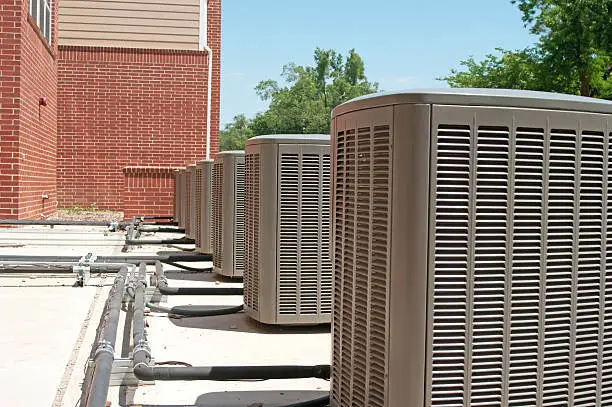
Heat pump rebate programs, led by entities like the Ontario government and utility companies, incentivize homeowners to adopt energy-efficient heating solutions. By offering financial incentives, these programs make heat pump systems more accessible, reducing the cost to install heat pumps.
In Ontario, programs like the Heat Pump Rebate Ontario 2024 and the Home Efficiency Rebate Plus (HER+) offer substantial savings on installations. Additionally, federal initiatives like the Canada Greener Homes Grant provide rebates of up to $5,000 for air source and ground source heat pumps, and up to $1,000 for heat pump hot water heaters.
By taking advantage of these programs, homeowners not only save money but also contribute to environmental sustainability by reducing carbon emissions. Heat pump rebate programs offer significant cost-saving opportunities, making the transition to energy-efficient heating more affordable for all.
Find more details on how to apply to the heat pump rebate program with our comprehensive guide via the link below.
https://thehvacservice.ca/heat-pump-rebate-programs-affordability-for-ontario-homeowners-in-2024/
At HVAC Service Solutions, we not only provide expert installation of heat pump systems but also assist homeowners in applying for these rebate programs. Contact us via the link below.
Professional Installation and Maintenance
Installing a heat pump involves initial costs, but the long-term savings and environmental benefits make it a worthwhile investment. HVAC Service Solutions offers professional installation by experienced technicians who determine the right type and size of heat pump for your property.
- Professional Installation: Our skilled technicians ensure proper installation, maximizing efficiency and comfort.
- Regular Maintenance: Our maintenance plans keep your heat pump in top condition, prolonging its lifespan and preventing costly repairs.
- Incentives and Rebates: We provide information on available incentives and assist with paperwork to maximize your savings, making heat pump installation more affordable.
Trust HVAC Service Solutions for expert installation and heat pump maintenance, ensuring efficient and reliable operation of your system. Contact us today to schedule a consultation.
Conclusion
In conclusion, heat pump systems offer a sustainable and cost-effective solution for heating and cooling homes. With energy-efficient operation and environmental benefits, they provide comfort while reducing carbon footprints.
Ready to save money and reduce your environmental impact? Contact HVAC Service Solutions today for expert installation and rebate assistance. Let’s create a greener future together.
Frequent Asked Questions
What is a heat pump, and how does it work?
A heat pump is a mechanical device that transfers thermal energy from one location to another, providing both heating and cooling functions. It operates on the principle of refrigeration and thermodynamics, using a refrigerant to absorb heat from a source (such as outdoor air, ground, or water) and releasing it at a higher temperature into a different space (such as indoors). The heat pump cycle involves four main components: an evaporator coil, compressor, condenser coil, and expansion valve. In heating mode, the refrigerant absorbs heat from the outdoor source, passes through the compressor to increase its temperature, and then releases the heat indoors. In cooling mode, the cycle is reversed, with heat being absorbed indoors and released outdoors.
What are the different types of heat pumps available?
Heat pumps come in various types, each utilizing different heat exchange mediums and operating principles. Air source heat pumps extract heat from the outdoor air using an outdoor unit, while ground source (geothermal) heat pumps transfer heat between the earth and the building through underground loops. Water source heat pumps extract heat from water bodies like lakes or ponds using water as a heat exchange medium. Additionally, hybrid heat pumps combine heat pump technology with a traditional furnace for enhanced efficiency and flexibility.
What are the advantages of using a heat pump?
Heat pumps offer several advantages over traditional heating and cooling systems. They are highly energy-efficient, as they transfer heat rather than generate it, resulting in lower energy consumption and reduced utility bills. Heat pumps also provide both heating and cooling functions, offering year-round comfort and versatility. Additionally, heat pumps produce fewer greenhouse gas emissions compared to fossil fuel-based heating systems, contributing to environmental sustainability. They can also improve indoor air quality by circulating and filtering air throughout the home.
How do heat pump rebate programs work in Ontario?
Heat pump rebate programs in Ontario are designed to incentivize homeowners to upgrade to energy-efficient heating and cooling systems. These programs, often administered by government agencies and utility companies, offer financial incentives or rebates to offset the upfront costs of purchasing and installing heat pump systems. Homeowners can apply for rebates through designated programs by meeting specific eligibility criteria and providing required documentation, such as proof of purchase and installation.
What is the Home Efficiency Rebate Plus (HER+) program?
The Home Efficiency Rebate Plus (HER+) program is a rebate initiative in Ontario aimed at promoting energy efficiency and sustainability in residential buildings. Through this program, homeowners can receive rebates for various energy-efficient upgrades, including heat pump installations. The HER+ program offers significant savings on eligible upgrades, helping homeowners reduce their energy consumption and utility costs while contributing to environmental conservation efforts.
What federal initiatives offer rebates for heat pump installations?
Federal initiatives like the Canada Greener Homes Grant provide financial incentives for homeowners to make energy-efficient upgrades to their homes, including heat pump installations. Under this grant program, homeowners can receive rebates of up to $5,000 for air source and ground source heat pumps, and up to $1,000 for heat pump hot water heaters. These rebates aim to encourage the adoption of renewable energy technologies and reduce greenhouse gas emissions in residential buildings.
How can HVAC Service Solutions help with heat pump installations?
HVAC Service Solutions offers professional installation services for heat pump systems, ensuring seamless integration and optimal performance. Their team of trained technicians has the expertise to assess property needs, recommend the most suitable heat pump type and size, and install the system efficiently and safely. Additionally, HVAC Service Solutions can assist homeowners in navigating rebate programs by providing guidance on eligibility requirements, documentation, and application processes.
Are heat pump systems suitable for all climates?
Yes, heat pump systems are suitable for various climates, including cold climates. Air source heat pumps can effectively extract heat from outdoor air, even in sub-zero temperatures, providing efficient heating during winter months. Ground source heat pumps offer consistent performance throughout the year, as they rely on the relatively stable temperature of the earth for heat exchange. Water source heat pumps also perform well in diverse climates, utilizing thermal energy from water bodies for heating and cooling.
What is the process for applying for heat pump rebates?
The process for applying for heat pump rebates typically involves several steps. Homeowners must first determine their eligibility for the rebate program based on factors such as property type, system requirements, and geographic location. Once eligibility is confirmed, homeowners can submit an application to the relevant rebate program, providing documentation such as proof of purchase, installation, and energy audit reports. Some programs may require an initial energy audit conducted by a registered contractor to assess the property’s energy efficiency and identify potential upgrades.
How can homeowners benefit from heat pump rebate programs?
Homeowners can benefit from heat pump rebate programs in several ways. Firstly, rebates help offset the upfront costs of purchasing and installing a heat pump system, making the transition to energy-efficient heating more affordable. Additionally, energy-efficient upgrades like heat pump installations can lead to long-term savings on utility bills, as heat pumps are more efficient than traditional heating and cooling systems. Moreover, by reducing energy consumption and greenhouse gas emissions, homeowners contribute to environmental sustainability and help create a healthier and more sustainable future for generations to come.
Share

